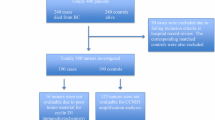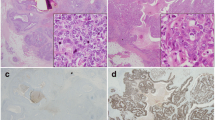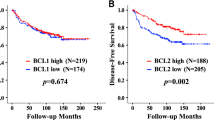Abstract
The tumour suppressor gene p53 and its protein controls critical cellular functions in cell cycle regulation as well as in apoptosis. Recently, in an in vitro study on breast cancer cell line MCF-7, the apoptotic function of p53 has been shown to be altered by overexpression of cyclin A. In this study we have demonstrated a similar association in a consecutive series of 166 breast cancer patients operated for invasive breast carcinomas. We detected mutations (exon 5–8) in the tumour tissue from 28 (16.0%) of the patients, and positive immunoreactivity of p53 protein was detected in tumour tissue samples from 32 (18.8%) patients. A statistically significant correlation between TP53 gene mutations and positive immunohistochemistry of p53 protein was observed (p = 0.0038). Mutations of the TP53 gene, as well as positive immunoreactivity to p53, were associated with poor prognosis (mutations p = 0.053, HR = 1.8, 95% CI 0.99–3.4; positive immunoreactivity p = 0.029, HR 1.33, 95% CI 1.0–1.7; mutation and/or positive immunoreactivity p = 0.015, HR 2.1, 95% CI 1.2–3.7) when cyclin A was not included in the survival analysis. However, when cyclin A overexpression was included, alteration of the p53 protein (mutations and/or positive immunoreactivity) lost its statistical power (p = 0.088). In a stratified survival analysis the OR fell from 3.0 (95% CI 1.2–8.3, p = 0.03) in the low-expression cyclin A stratum to 1.3 (95% CI 0.42–4.1, p = 0.77) in the overexpression cyclin A stratum.
Similar content being viewed by others
References
Geisler S, Lonning PE, Aas T, Johnsen H, Fluge O, Haugen DF, Lillehaug JR, Akselsen LA, Borresrn-Dale AL: Influence of TP53 gene alterations and c-erbB-2 expression on the response to treatment with doxorubicin in locally advanced breast cancer. Cancer Res 61: 2505-2512, 2001
Allred DC, Clark GM, Elledge R, Fuqua SA, Brown RW, Chamness GC, Osborne CK, McGuire WL: Association of p53 protein expression with tumor cell proliferation rate and clinical outcome in node-negative breast cancer. J Natl Cancer I 85: 200-206, 1993
Andersen TI, Borresen AL: Alterations of the TP53 gene as a potential prognostic marker in breast carcinomas. Advantages of using constant denaturant gel electrophoresis in mutation detection. Diagn Mol Pathol 4: 203-211, 1995
Bergh J, Norberg T, Sjogren S, Lindgren A, Holmberg L: Complete sequencing of the p53 gene provides prognostic information in breast cancer patients, particularly in relation to adjuvant systemic therapy and radiotherapy. Nat Med 1: 1029-1034, 1995
Gasparini G, Toi M, Verderio P, Ranieri G, Dante S, Bonoldi E, Boracchi P, Fanelli M, Tominaga T: Prognostic significance of p53, angiogenesis, and other conventional features in operable breast cancer: subanalysis in node-positive and node-negative patients. Int J Oncol 12: 1117-1125, 1998
el-Deiry WS, Tokino T, Velculescu VE, Levy DB, Parsons R, Trent JM, Lin D, Mercer WE, Kinzler KW, Vogelstein B: WAF1, a potential mediator of p53 tumor suppression. Cell 75: 817-825, 1993
Hsieh JK, Yap D, O'Connor DJ, Fogal V, Fallis L, Chan F, Zhong S, Lu X: Novel function of the cyclin A binding site of E2F in regulating p53-induced apoptosis in response to DNA damage. Mol Cell Biol 22: 78-93, 2002
Rosenblatt J, Gu Y, Morgan DO: Human cyclin-dependent kinase 2 is activated during the S and G2 phases of the cell cycle and associates with cyclin A. P Natl Acad Sci USA 89: 2824-2828, 1992
Walker DH, Maller JL: Role for cyclin A in the dependence of mitosis on completion of DNA replication. Nature 354: 314-317, 1991
Pagano M, Pepperkok R, Verde F, AnsorgeW, Draetta G: Cyclin A is required at two points in the human cell cycle. EMBO J 11: 961-971, 1992
Faha B, Ewen ME, Tsai LH, Livingston DM, Harlow E: Interaction between human cyclin A and adenovirus E1Aassociated p107 protein. Science 255: 87-90, 1992
Bandara LR, Adamczewski JP, Hunt T, La Thangue NB: Cyclin A and the retinoblastoma gene product complex with a common transcription factor. Nature 352: 249-251, 1991
Mudryj M, Devoto SH, Hiebert SW, Hunter T, Pines J, Nevins JR: Cell cycle regulation of the E2F transcription factor involves an interaction with cyclin A. Cell 65: 1243-1253, 1991
Volm M, Koomagi R, Mattern J, Stammler G: Cyclin A is associated with an unfavourable outcome in patients with non-small-cell lung carcinomas. Brit J Cancer 75: 1774-1778, 1997
Chao Y, Shih YL, Chiu JH, Chau GY, Lui WY, Yang WK, Lee SD, Huang TS: Overexpression of cyclin A but not Skp 2 correlates with the tumor relapse of human hepatocellular carcinoma. Cancer Res 58: 985-990, 1998
Handa K, Yamakawa M, Takeda H, Kimura S, Takahashi T: Expression of cell cycle markers in colorectal carcinoma: superiority of cyclin A as an indicator of poor prognosis. Int J Cancer 84: 225-233, 1999
Aaltomaa S, Lipponen P, Ala-Opas M, Eskelinen M, Syrjanen K, Kosma VM: Expression of cyclins A and D and p21(waf1/cip1) proteins in renal cell cancer and their relation to clinicopathological variables and patient survival. Brit J Cancer 80: 2001-2007, 1999
Florenes VA, Maelandsmo GM, Faye R, Nesland JM, Holm R: Cyclin A expression in superficial spreading malignant melanomas correlates with clinical outcome. J Pathol 195: 530-536, 2001
Michalides R, van Tinteren H, Balkenende A, Vermorken JB, Benraadt J, Huldij J, van Diest P: Cyclin A is a prognostic indicator in early stage breast cancer with and without tamoxifen treatment. Brit J Cancer 86: 402-408, 2002
Bukholm IR, Bukholm G, Nesland JM: Over-expression of cyclin A is highly associated with early relapse and reduced survival in patients with primary breast carcinomas. Int J Cancer 93: 283-287, 2001
Elston CW, Ellis IO: Pathological prognostic factors in breast cancer. I. The value of histological grade in breast cancer: experience from a large study with long-term follow-up. Histopathology 19: 403-410, 1991
Bukholm IK, Nesland JM, Karesen R, Jacobsen U, Borresen AL: Relationship between abnormal p53 protein and failure to express p21 protein in human breast carcinomas. J Pathol 181: 140-145, 1997
Guldberg P, Nedergaard T, Nielsen HJ, Olsen AC, Ahrenkiel V, Zeuthen J: Single-step DGGE-based mutation scanning of the p53 gene: application to genetic diagnosis of colorectal cancer. Hum Mutat 9: 348-355, 1997
Borresen AL, Hovig E, Smith-Sorensen B, Malkin D, Lystad S, Andersen TI, Nesland JM, Isselbacher KJ, Friend SH: Constant denaturant gel electrophoresis as a rapid screening technique for p53 mutations. P Natl Acad Sci USA 88: 8405-8409, 1991
Clarke AR, Purdie CA, Harrison DJ, Morris RG, Bird CC, Hooper ML, Wyllie AH: Thymocyte apoptosis induced by p53-dependent and independent pathways. Nature 362: 849-852, 1993
Lowe SW, Bodis S, McClatchey A, Remington L, Ruley HE, Fisher DE, Housman DE, Jacks T: p53 status and the efficacy of cancer therapy in vivo. Science 266: 807-810, 1994
Lowe SW, Ruley HE, Jacks T, Housman DE: p53-dependent apoptosis modulates the cytotoxicity of anticancer agents. Cell 74: 957-967, 1993
Fan S, el-Deiry WS, Bae I, Freeman J, Jondle D, Bhatia K, Forance AJ, Magrath I, Kohn KW, O'Conner PM: p53 gene mutations are associated with decreased sensitivity of human lymphoma cells to DNA damaging agents. Cancer Res 54: 5824-5830, 1994
Archer SG, Eliopoulos A, Spandidos D, Barnes D, Ellis IO, Blamey RW, Nicholson RI, Robertson JF: Expression of ras p21, p53 and c-erbB-2 in advanced breast cancer and response to first line hormonal therapy. Brit J Cancer 72: 1259-1266, 1995
Elledge RM, Green S, Howes L, Clark GM, Berardo M, Allred DC, Pugh R, Ciocco D, Ravdin P, O'sullivan J, Rivkin S, Martino S, Osborne CK: bcl-2, p53, and response to tamoxifen in estrogen receptor-positive metastatic breast cancer: a Southwest Oncology Group study. J Clin Oncol 15: 1916-1922, 1997
Author information
Authors and Affiliations
Rights and permissions
About this article
Cite this article
Bukholm, I.R., Husdal, A., Nesland, J.M. et al. Overexpression of Cyclin A Overrides the Effect of p53 Alterations in Breast Cancer Patients with Long Follow-up Time. Breast Cancer Res Treat 80, 199–206 (2003). https://doi.org/10.1023/A:1024527220362
Issue Date:
DOI: https://doi.org/10.1023/A:1024527220362




